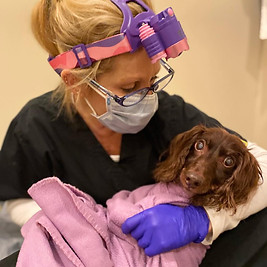
Please note:
We are not currently taking new clients here at All Creatures Wise & Wonderful. Please feel free to give us a call or check back with this site in the future, as we will update this banner when we are taking new clients again.
Anesthesia-Free Dental Care
Does my pet need this?
Can you imagine what your teeth would look, feel, and smell like if you never brushed your teeth or had a professional dental cleaning done? It's no different for your furry companions. Tartar and plaque left to accumulate not only causes periodontal disease, but is linked to diabetes, cardiovascular disease, respiratory disease, cancer, canine cognitive disorder (senility), autoimmune diseases and increased severity of epilepsy. So yes, your pet's teeth need as much care as yours do!


How often should a cleaning be done?
Just like with you, dental care is an important and necessary part of your pet's well-being. Even with daily home-care, your pet requires annual, bi-annual, or sometimes quarterly dental appointments to remove built up tartar, examine tissues, reduce halitosis and prevent or halt periodontal disease. Factors contributing to your pet's oral health individually or cumulatively include breed/genetics, diet, health status, gut health, and medication or supplements - and of course dental brushing habits. It only takes 2-3 days for soft plaque to develop into hard, sometimes tenacious tartar. Manual removal of deposits is necessary by hand or with ultrasonic instruments to keep your pet happy, healthy, and comfortable.
How does it work?
The method of cleaning we offer at All Creatures Wise & Wonderful does not require anesthesia. This is ideal for medically compromised pets, senior pets, and also young dogs and cats that don't require surgery. The process is similar to what you experience when you see your dental hygienist. Your pet's teeth are cleaned and examined with the same instruments used in human dental cleanings: curettes, scalers, probes, explorers, forceps, mirrors, etc. An ultrasonic device is not used in this method due to sound, vibration and water that could compromise the compliance of a furry patient. All of the products used (prophy paste/polish, toothpaste, antiseptics) are intended for use on dogs and cats and are safe if ingested.

Before

After

What should I expect?
The first step is to set up an initial consultation, which will enable determination if an anesthesia-free dental appointment is appropriate for your dog or cat and if so, what level of cleaning is required. There are three tiers available for the dental cleaning appointment; a basic 1 hour appointment, a 1½ hour appointment which is split between two visits, and a 2 hour appointment which is also split between two visits to the clinic. If your pet requires premedication, this will be determined during your consultation as well. You may want to consider coupling your pet's dental appointment with a Reiki treatment if they tend to be anxious, or following-up with a PEMF session if they have a lot of aches and pains. If your pet is not a candidate for dental cleaning without anesthesia, you will be referred to your veterinarian or dental specialist. Factors that would influence this decision would be the existence of fractured or diseased teeth requiring extraction, suspicious lesions or masses, injuries, or a very aggressive or anxious personality unaltered by medication, making an anesthesia-free cleaning unsafe. Sometimes, during an anesthesia-free dental cleaning, more severe disease is uncovered than was expected, and referral for additional work under anesthesia will be recommended as professionally appropriate.
A note on anesthesia...
An anesthesia-free dental appointment does not always mean your pet will never need dental surgery under anesthesia. Just as with people, changes occur with teeth and oral issues over time. Dental x-rays require your pet to be anesthetized, as do tooth extractions and most biopsies.
However, with regular home care and regular cleanings, we can work together to reduce the frequency of dental cleanings under anesthesia. Home-care recommendations and the frequency of dental cleanings will be discussed with you after your companion's appointment.